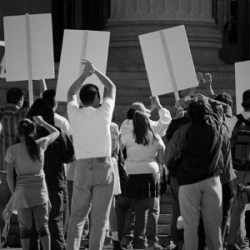Now Featured in the Patheos Book Club
Our Last Option: How a New Approach to Civility Can Save the Public Square
By Andrew Marin
Andrew Marin, President and Founder of The Marin Foundation, has spent nearly two decades working on bridges. Not physical bridges, but community bridges—between the LGBT community and evangelicals, between victims and perpetrators, and between liberals and conservatives. While his first book was about the conversation about sexuality and spirituality, his newer work is around methodology—how do we build bridges adversarial situations?
As part of the Patheos Book Club on Our Last Option, Andrew talked with Patheos about his Our Last Option, how it came about, and what we might discover in reading it.
Could you begin by telling us why you wrote this book? What key experiences or conversations triggered the need for this?
I wrote Our Last Option to answer the question most frequently asked of The Marin Foundation over the past five years: "What is the actual process you use to build bridges?" My previous book, Love Is an Orientation, explored building bridges between the LGBT community and social, political, and theological conservatives, which, at its release in 2009, was a new concept. Because of its newness, Love Is an Orientation didn't address the actual bridge building process we use, but rather it laid the groundwork to compel others to engage in the culture war differently.
The book was well received, though controversial, by partisan activists on both sides of the disconnect. Yet it caught the eye of the United Nations, in particular, and when we were asked by the UN to give trainings and educational classes to their various agencies, the national and international requests to further understand our bridge building process increased. So Our Last Option is an e-book exploring the exact model of engagement The Marin Foundation has used for over a dozen years, from our local context in the predominantly LGBT Boystown neighborhood in Chicago, all the way to international leaders and field workers on how to build sustainable bridges between opposing worldviews.
You begin your book with a series of definitions, recognizing that we all need to be on the same page about meanings before we can dialogue. Can you just outline this place of common ground for us and describe what you believe to be the dangers we're facing?
In 1864, while addressing the Sanitary Fair in Baltimore, Maryland, Abraham Lincoln poignantly spoke to the need for clarity and commonality in linguistic understanding:
We all declare for liberty; but in using the same word we do not all mean the same thing. With some the word "liberty" may mean for each man to do as he pleases with himself, and the product of his labor; while with others, the same word many mean for some men to do as they please with other men, and the product of other men's labor. Here are two, not only different, but incompatible things, called by the same name—liberty. And it follows that each of the things is, by the respective parties, called by two different and incompatible names—liberty and tyranny.
I fully believe Lincoln's analysis in 1864 is just as applicable to the disconnects in most contemporary Western societies. Instead of "liberty" in Lincoln's time, it is "sin" or "civic engagement" or "human rights" or "marriage" today. The result is always the same: with any given topic, each of the opposing populations believes they have the correct definition, and therefore the correct worldview. This presupposes the other worldview is wrong and in need of change; a scenario that always ends in a fight—physically, culturally, or sociopolitically.
I have found that one of the simplest ways to reduce traditional points of argument is, from the outset, to put forth a common set of definitions for the most contentious of terms. Through this, both parties can engage in the bridge building process from, at least in a small way, similar footing. Though I don't expect everyone to agree with the definitions, it does provide an initial framework from which to engage the concepts most often fought over, thus minimizing the problem that both Lincoln's example and contemporary society continually hit against.




